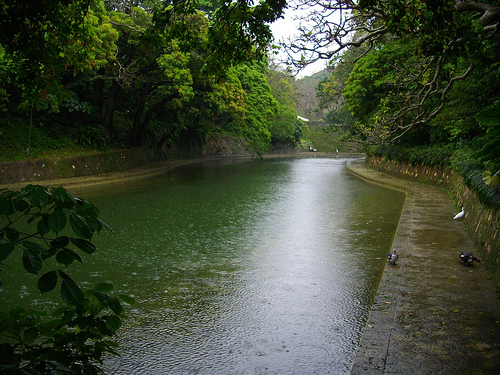Difference between revisions of "Ryutan"
| (One intermediate revision by the same user not shown) | |||
| Line 1: | Line 1: | ||
[[File:Ryutan.jpg|right|thumb|500px|The Ryûtan Pond.]] | [[File:Ryutan.jpg|right|thumb|500px|The Ryûtan Pond.]] | ||
*''Built: [[1427]]'' | *''Built: [[1427]]'' | ||
| − | *''Other Names'': | + | *''Other Names'': 魚小堀 ''([[Okinawan language|O]]: iyugumui)'', 円鑑池 ''(Enkanchi)'' |
*''Japanese'': 龍潭 ''(Ryuutan)'' | *''Japanese'': 龍潭 ''(Ryuutan)'' | ||
| − | Ryûtan ("dragon depths") is a pond located near [[Shuri castle]], the [[Ryukyu Kingdom|Ryukyuan]] royal palace. | + | Ryûtan ("dragon depths") is a pond located near [[Shuri castle]], the [[Ryukyu Kingdom|Ryukyuan]] royal palace. It is roughly 416 meters in circumference, and 7.575 square meters in area. Historically filled with fish, it was also known as ''iyugumui'' (lit. "fish pond"). |
It was designed by Chinese-born Ryukyuan official [[Kaiki]] during the reign of King [[Sho Hashi|Shô Hashi]], and collects water from the "''zuisen''" pure water spring at the palace. When [[Chinese investiture envoys]] were resident on the island, they would celebrate [[Chrysanthemum Festival]] with boats on the pond, while members of the court performed music and dances. | It was designed by Chinese-born Ryukyuan official [[Kaiki]] during the reign of King [[Sho Hashi|Shô Hashi]], and collects water from the "''zuisen''" pure water spring at the palace. When [[Chinese investiture envoys]] were resident on the island, they would celebrate [[Chrysanthemum Festival]] with boats on the pond, while members of the court performed music and dances. | ||
| Line 10: | Line 10: | ||
A hall dedicated to the goddess [[Benten]] stands amidst the pond (then called Enkan Pond); it was built in [[1502]] to house a collection of [[sutra]]s from Korea. A small bridge, originally called Kanren-bashi and later renamed Tennyo-bashi, was built at the same time and provides access to the hall. The bridge is built of Ryukyuan limestone, in a southern Chinese style. The hall was destroyed in the [[1609]] [[invasion of Ryukyu|invasion of Ryûkyû]] along with the sutra collection, but the hall was rebuilt by [[1621]].<ref>Gallery labels at [[Tamaudun]].[https://www.flickr.com/photos/toranosuke/15282595067/sizes/h/]</ref> | A hall dedicated to the goddess [[Benten]] stands amidst the pond (then called Enkan Pond); it was built in [[1502]] to house a collection of [[sutra]]s from Korea. A small bridge, originally called Kanren-bashi and later renamed Tennyo-bashi, was built at the same time and provides access to the hall. The bridge is built of Ryukyuan limestone, in a southern Chinese style. The hall was destroyed in the [[1609]] [[invasion of Ryukyu|invasion of Ryûkyû]] along with the sutra collection, but the hall was rebuilt by [[1621]].<ref>Gallery labels at [[Tamaudun]].[https://www.flickr.com/photos/toranosuke/15282595067/sizes/h/]</ref> | ||
| − | A stele was erected upon the reconstruction of Tennyo-bashi in [[1744]]; after that stele fell, it was re-erected along with the bridge in [[1798]]. The latter stele was severely damaged in the 1945 Battle of Okinawa, but a large section survives in the Okinawa Prefectural Museum; a reconstruction stands by the bridge today. | + | A stele was erected upon the reconstruction of Tennyo-bashi in [[1744]]; after that stele fell, it was re-erected along with the bridge in [[1798]]. The latter stele was severely damaged in the 1945 Battle of Okinawa, but a large section survives in the Okinawa Prefectural Museum; a reconstruction stands by the bridge today. Following their destruction in the war, the Benten-dô was rebuilt in 1968, and the Tennyo-bashi bridge the following year.<ref>"Shurijô fukugen no keii" 首里城復元の経緯, ''Ryukyu Shimpo'', 1 Nov 1992.</ref> |
==References== | ==References== | ||
*"[http://ryukyushimpo.jp/news/storyid-43447-storytopic-121.html Ryûtan]." Okinawa Compact Encyclopedia 沖縄コンパクト事典, Ryukyu Shimpo, 1 March 2003. | *"[http://ryukyushimpo.jp/news/storyid-43447-storytopic-121.html Ryûtan]." Okinawa Compact Encyclopedia 沖縄コンパクト事典, Ryukyu Shimpo, 1 March 2003. | ||
| − | *Plaques on-site at Shuri castle.[https://www.flickr.com/photos/toranosuke/15437125951/sizes/k/][https://www.flickr.com/photos/toranosuke/15282869110/sizes/h/][https://www.flickr.com/photos/toranosuke/15282954957/sizes/h/] | + | *Plaques on-site at Shuri castle.[https://www.flickr.com/photos/toranosuke/15437125951/sizes/k/][https://www.flickr.com/photos/toranosuke/15282869110/sizes/h/][https://www.flickr.com/photos/toranosuke/15282954957/sizes/h/][https://www.flickr.com/photos/toranosuke/15446363676/sizes/h/] |
<references/> | <references/> | ||
[[Category:Ryukyu]] | [[Category:Ryukyu]] | ||
[[Category:Historic Buildings]] | [[Category:Historic Buildings]] | ||
Latest revision as of 00:19, 22 November 2019
Ryûtan ("dragon depths") is a pond located near Shuri castle, the Ryukyuan royal palace. It is roughly 416 meters in circumference, and 7.575 square meters in area. Historically filled with fish, it was also known as iyugumui (lit. "fish pond").
It was designed by Chinese-born Ryukyuan official Kaiki during the reign of King Shô Hashi, and collects water from the "zuisen" pure water spring at the palace. When Chinese investiture envoys were resident on the island, they would celebrate Chrysanthemum Festival with boats on the pond, while members of the court performed music and dances.
A hall dedicated to the goddess Benten stands amidst the pond (then called Enkan Pond); it was built in 1502 to house a collection of sutras from Korea. A small bridge, originally called Kanren-bashi and later renamed Tennyo-bashi, was built at the same time and provides access to the hall. The bridge is built of Ryukyuan limestone, in a southern Chinese style. The hall was destroyed in the 1609 invasion of Ryûkyû along with the sutra collection, but the hall was rebuilt by 1621.[1]
A stele was erected upon the reconstruction of Tennyo-bashi in 1744; after that stele fell, it was re-erected along with the bridge in 1798. The latter stele was severely damaged in the 1945 Battle of Okinawa, but a large section survives in the Okinawa Prefectural Museum; a reconstruction stands by the bridge today. Following their destruction in the war, the Benten-dô was rebuilt in 1968, and the Tennyo-bashi bridge the following year.[2]
